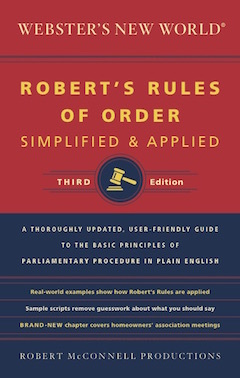Do your bylaws follow the principles of democracy?
Welcome to the PARLIAMENTARY INTERNET NEWSLETTER. This newsletter is for all those who are interested in learning about better meeting procedures, and the preserving of democracy in small groups, organizations, churches, schools and government organizations. We promise to keep the information simple so that all can understand; and we promise to try to answer any questions that you may have concerning any problems in your meetings. We will answer any procedural questions that you have,too. We are most familiar with the parliamentary authority of ROBERT'S RULES OF ORDER, NEWLY REVISED, 1990 Edition. But we have access to THE STANDARD CODE OF PARLIAMENTARY PROCEDURE, by Alice Sturgis, and to DEMETER'S MANUAL OF PARLIAMENTARY LAW AND PROCEDURE, by George Demeter.
PARLIAMENTARY INTERNET NEWS LETTER VOLUME 3 Issue 3 June, 1997
ARE YOUR BYLAWS DEMOCRATIC?
Frequently, I have the opportunity to examine different organization’s bylaws. Recently I have examined two national organizations’ bylaws. I was appalled at what I read -- members did not have much say. So I came up with a list of questions to test if your organization is democratic or undemocratic.
1. Do your bylaws give the final power to the members or to a board of directors?
2. If the bylaws give the power to the board of directors do they provide for ways for the members to bring business before the board to consider? Do they provide for a way for the members to reverse a board’s action?
3. If the board has the power, do the bylaws allow for members to bring up new business at an Annual meeting or other general membership meetings?
4. Do your bylaws provide for the majority to rule?
5. Do your bylaws protect the rights of the minority and absent members by requiring a two-thirds vote to remove from membership or in amending bylaws?
6. Do your bylaws provide for a fair and equitable way to nominate and elect officers and board members? Do your bylaws provide for an impartial nominating committee and nominations from the floor?
7. Do your bylaws allow all members who wish to serve on committees the opportunity to serve?
8. Do your bylaws allow new members to be immediatley active in the organization? Or do they provide for a “probationary” period? Is there a valid reason for this “probationary” period?
9. Do your bylaws provide for proper notification of removal from membership because of failure to pay dues?
10. Do your bylaws set the month and day for all meetings and for proper notification?
11. Do your bylaws set a reasonable quorum requirement so that meetings can be held?
12. Do your bylaws provide for a way to withdraw from the organization and from an office or committee assignment?
13. Do your bylaws provide for a way to fill a vacancy and perhaps declare a vacancy?
14. Do your bylaws provide for a way to remove someone from office or a committee appointment if they are not performing the assigned duties?
15. Do your bylaws provide for a way for members to call a special meeting?
16. If you have representation by delegation, do the bylaws explain how the delegates are chosen and provide for alternate delegates?
17. Do your bylaws provide for a way for members to propose amendments to the bylaws?
18. Do the bylaws provide for a parliamentary authority?
The most common questions I answer for people are related to their bylaws. In helping one man, I discovered that there was no provision at the annual meeting for “new” business. So look at your bylaws carefully, amend them if necessary. Next month’s newsletter will be about HOW to amend bylaws.
